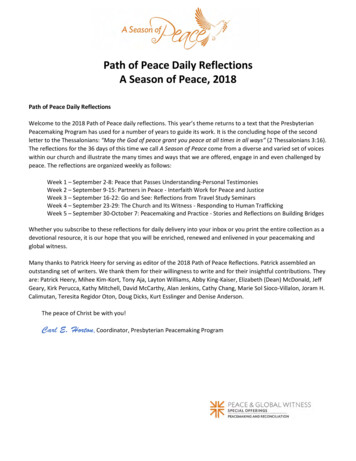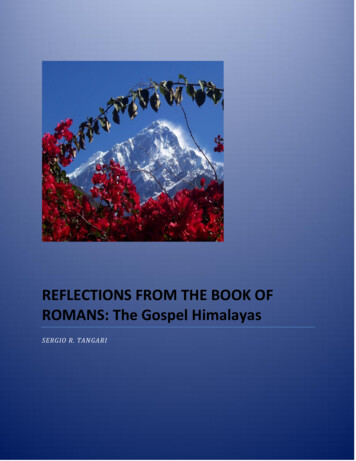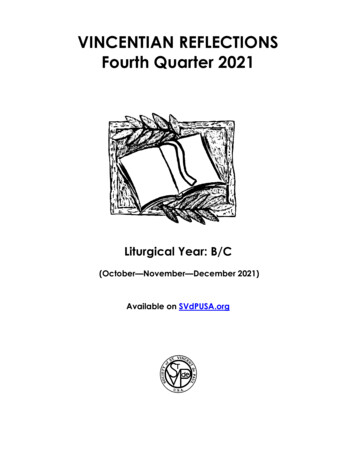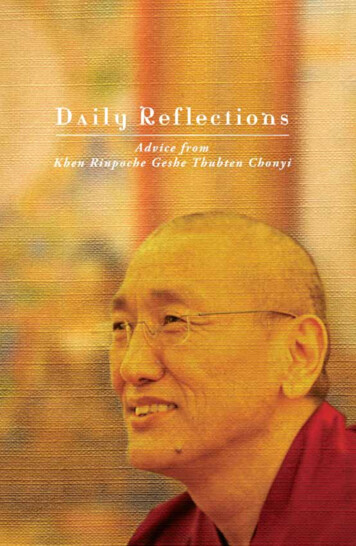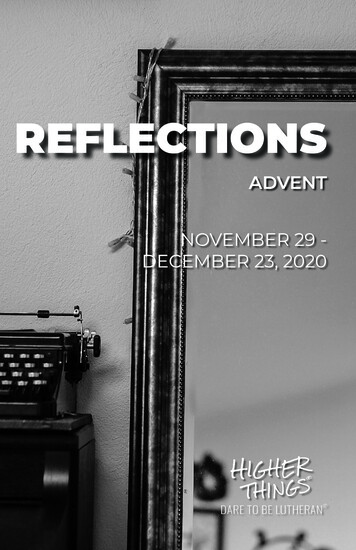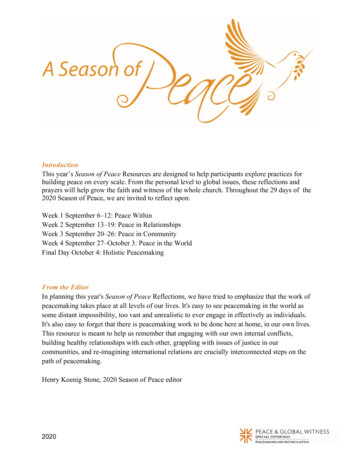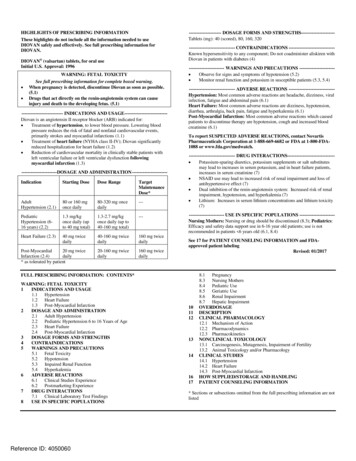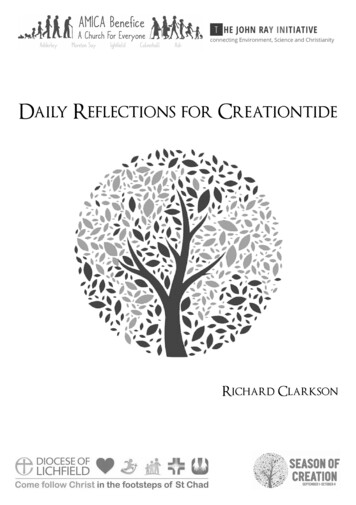
Transcription
Daily Reflections for CreationtideRichard Clarkson
IntroductionThe season of Creationtide, also known as the Season Of Creation, has itsorigins in the Eastern Orthodox Church which in 1989 declared September1st as a day of prayer for creation. Over the following decades, as awarenessof the present ecological challenges facing our world grew, this single day ofprayer developed into a liturgical season running from September 1st toOctober 4th, the feast day of St Francis of Assisi.This season of Creationtide has been embraced by the leaders of theAnglican, Catholic and Orthodox churches, as well as by several majorecumenical groups including the World Council of Churches. DuringCreationtide Christians around the world are encouraged to pray for, andcare for, God’s good creation.This book is written as a companion to the season of Creationtide, offeringopportunities for reflection and response each day. It is not written with thepurpose of convincing the reader that the world was indeed created by theGod of the Bible. Instead it will look in a variety of ways at what it mightmean to live within a created world, to help the reader to reflect on theirplace and role in the world that God has made, and to let that inform theirfaith. The daily reflections will draw on a wide range of writers and thinkersfrom across the Christian tradition, as well as from my own experience.Although the reflections are intended to be used during the five weeks ofCreationtide, they could be used at any time during the year.Each week will follow a broad theme, expressing it through reflection,experience, poetry and question, though of course there will be a naturaloverlap between the different weeks’ themes. Week one will focus aroundGod the Creator, reflecting on what that says about God and about theworld. Week two will explore the place and role of humans within thecreated world. Week three will look at how creation praises the creator, andhow it can inspire and shape our praise. Week four will ponder how we canprayerfully see and encounter the creator within the creation. Finally weekfive will take inspiration from women and men across the Christian traditionwho have had a particular connection with creation.
As an accompaniment to these reflections the book also begins with asuggested form of prayers which include within them space to use both thereflections. You may find it helpful to sit outdoors as you read the prayersand reflections. If this is not practical then I’d suggest sitting by a window,holding a stone or twig, or in some other way connecting yourself with thenatural world while you read.Much of the thinking behind these reflections was worked out in two places.Firstly it was developed on a theoretical level through writing my mastersthesis on Nature Contemplation at The Queen’s Foundation for EcumenicalTheological Education which formed part of my curacy training in theDiocese of Lichfield. This research, which centred around the writings ofMaximus the Confessor, was formative in giving a solid theologicalgrounding to my thoughts about the place of nature contemplation as aChristian spiritual discipline. I am extremely grateful to the Diocese for theopportunity to study at this level. This theoretical understanding wasworked out on a practical level through the Mossy Church group which weran on a local nature reserve in the parishes where I was a curate.My thanks are due to the five churches of the AMICA Benefice in a beautifulcorner of North Shropshire where I am Rector, and who have allowed metime to work on these reflections. Thanks also to the John Ray Initiative,and Martin Hodson in particular, for agreeing to publish these reflectionsduring Creationtide 2018. Above all thanks to my wife, Lucie, and ourboys—Charlie, Toby, and Luca—for their encouragement, support, patienceand love as I have shut myself away in my study late into the night writing.This book is my attempt to offer some of my learning and experience todiocese and the wider church and hopefully to help others to use the seasonof Creationtide in such a way that both heart, mind, body and soul arestimulated to love the creation, and the creator, more deeply.Rev’d Rich ClarksonMoreton Say, August 13th 2018The feast day of St Maximus the Confessor
Daily Prayers
Daily PrayersAll:All:All:All:In the name of God the FatherWho made Heaven and earthIn the name of God the SonWho became a creature like usIn the name of God the Holy SpiritWho sustains all life on earthIn the name of GodFather, Son and Holy Spirit. Amen.The day’s reflection is read, followed by a time of silenceAll:In the world around us, this day we prayYour kingdom comeAll:In the world before us, this day we prayYour kingdom comeAll:In the world beside us, this day we prayYour kingdom comeAll:In the world within us, this day we prayYour kingdom comeThe Lord’s Prayer may be saidSilence is keptAll:God of wonder, go with us into this new daySpeak to us, refresh us, astound us,that we may grow to love you,and your world, more deeply.Amen.
Daily ReflectionsWeek One:Creator
Week One, Day OneIn the beginning God created the heavens and the earth.Genesis 1:1The famous opening words of the Bible, the Old Testament, the Torah, setthe scene for all that is to come: In the beginning God created the heavensand the earth. All that was, all that is, all that will be, all this comes fromGod. Right from the off the Bible speaks of a God who is not passive ordistant, but active and involved. The opening chapter goes on to describethe scale, the diversity, the goodness of God’s creation, but here it is enoughto simply reflect on the one who creates.Basil of Caesarea—the first of many such figures we shall meet over thecoming weeks—was a Bishop in the fourth century in what is now Turkey.In one of his sermons he compared God the creator to a potter who, afterpainstakingly crafting a series of beautiful pots, ‘has not exhausted either hisart or his talent’. The creation of the world was not a one time burst ofenergy that left God exhausted, rather it was a pouring out of somethingdeep within God—a desire to create, to bring about beauty and order and allthat is good. God created because God is creative and God’s creativity doesnot run dry.This creative heart has left its fingerprints throughout the creation: in thewild evolution of nature, in the instinctive desire of our earliest ancestors tomake art on the walls of their caves, in the stories that we tell to ourchildren. The world is filled with creativity because it was created by acreative God whose art and talent are inexhaustible. In the beginning Godcreated the heavens and the earth—and that was only the beginning!What signs of God’s creativity can you see around you,or within you today?
Week One, Day TwoBy the word of the Lord the heavens were made,their starry host by the breath of his mouth.Psalm 33:6The protesters were getting agitated by this point. They were frustrated bythe impassive faces before them and wanted to see something, someacknowledgement of their pain, some understanding of their plight, but theywere met with blank stares. It’s unclear who threw the first bottle but itcertainly got a response and soon a second, and then a third bottle flewthrough the air. Just as it looked like the situation was about to unravel, avoice pierced the air. An elderly woman near the front of the crowd wassinging with a power that belied her slight stature. ‘We shall live in peace,’she sang, ‘we shall overcome’. Her voice carried far across the square,prompting others to join in, and her words of peace restored peace to thatvolatile gathering.In the right circumstances, with the right authority, a breath can be apowerful thing. It can calm a troubled crowd, summon a sleeping parent,convey the deepest grief, give a world-changing order, restore a loved one tolife. A breath can be a powerful thing.In the Bible the breath of God is rightly spoken of with the utmost respect.It is the breath of God which creates the starry host (Ps 33:6), gives life toAdam (Gen 2:7), brings forth ice (Job 37:10) and fire (Job 41:21), and fills thedisciples with the Holy Spirit (Jn 20:22). The breath of God is a powerful,creative force. God didn’t need tools to create the universe, God simplyspoke—or perhaps, as C.S. Lewis so memorably described in The Magician’sNephew, sang—the world into being. By the breath of God’s mouth, creationbegan.Pay attention to the creative power of your breath today,let this remind you of the breath of God.
Week One, Day ThreeThen God said, ‘Let there be light’; and there was light.Genesis 1:3The early Celtic Christians knew the significance of that first command, ‘letthere be light’. J. Philip Newell, in his introduction to Celtic Spirituality,explains that for the Celts there was a distinct difference between the lightof the first day of creation, and the light of the fourth day of creation. Thelight of the fourth day—the sun, moon and stars—is a visible light. The lightof the first day, however, is the light of being, from which ‘inaccessible lightof God all life comes forth’. Without this light, nothing could exist. Thisechoes the opening of John’s gospel, ‘In him was life, and the life was thelight of all people.’Thinking about light in this way can help us to think about God. If youshine a torch across a dark room you cannot see the beam unless it hassomething to reflect off—a speck of dust perhaps, or a far wall. The lightreveals and illuminates all that it sees, yet it is still somehow mysterious.That same sense of mystery and wonder is felt when watching the sun set.However much we may understand the physics of atmospheric diffractionand spectral dispersion, to see the sky slowly light up in a magnificentcolour display is guaranteed to invoke a profound feeling of awe.For the Celts, light was not a symbol of release from what would otherwisebe dark, rather, as Newell puts it, ‘redemption is about light being liberatedfrom the heart of creation and from the essence of who we are.’ With thosefirst words of creation God filled the whole creation with the light of life,and that same light illuminates all life to this day.Try to notice the light around you as you go about your day today.Let it draw you into the presence of the God of light.
Week One, Day FourIn him all things in heaven and on earth were created, things visible andinvisible all things have been created through him and for him.Colossians 1:16Maximus the Confessor—another figure who will return as we journeythrough this season together—was, as a young man in the early seventhcentury, rising fast through the ranks of Constantinople’s high society.However he renounced this life to become a monk, first in what is nowTurkey, and later in North Africa where he became a prolific writer.Maximus wrote about how the universe was created out of nothing by God.And if the universe was created out of nothing by God, he said, theneverything that exists somehow comes from God. And if everything thatexists somehow comes from God then everything contains some imprint,some essence, of the creator's intention within it.This means that the amazing diversity of creation tells us somethingprofound about the power and imagination of the creator. It also means thatas we pay attention to the world around us we can begin to see God’sfingerprints in all that has been made.A constantly flowing stream reminds us of God’s unfailing mercy. Therugged bark of an exposed tree speaks of God’s protection. A mother birdsheltering and providing for her chicks is an image of God’s care. A nightsky full of stars reveals the overwhelming magnitude of God. On their owneach of these only says a little about God, but together they build up apicture of the creator.What signs of God’s fingerprints can you see around you today?
Week One, Day FiveThe earth is the Lord’s, and everything in it.Psalm 24:1One of the most commonly requested hymns at weddings and funerals is‘All things Bright and Beautiful’. Most clergy and organists I know have tosuppress an inner sigh when they hear this old favourite suggested. Forthose who are involved in these services regularly it may feel overused,however I think the reason it is so popular is because it does resonate withpeople’s understanding of God, and the world.All things bright and beautiful, all creatures great and small,all things wise and wonderful, the Lord God made them all.It’s a profoundly simple encapsulation of the essence of biblical creationtheology—God made it all. Of course the hymn only focusses on the brightand the beautiful, so we must thank Monty Python for suggesting someadditional verses to balance it out:All things dull and ugly, All creatures short and squat,All things rude and nasty, The Lord God made the lot.It’s easy to think of God as the creator of a beautiful flower, a starlit night, ora crashing waterfall, but God is the creator of all creation—the good, the badand the ugly. In the coming weeks we will look at some of the ways inwhich the beauty and integrity of creation has been damaged by humanaction. Our starting point, however, must be that all life is good, be itmeerkat or mosquito, wisteria or wasp, bluebell or bindweed. All life hasvalue because all life comes from God. Bright and beautiful or dull andugly—the Lord God made them all.Notice the ‘dull and ugly’ parts of God’s creation today—can you find beauty in them?
Week One, Day SixThe Creator of the heavens.who spreads out the earth with all that springsfrom it, who gives breath to its people, and life to those who walk on it.Isaiah 42:5Around 400 million years ago life on earth was concentrated almost entirelyin the oceans as the atmosphere was unbreathable. Scientist have recentlyshown that the organism responsible for filling this toxic environment withclean, freshly oxygenated air was, as the Guardian Newspaper put it, the‘humble moss’. Without the carpet of moss that gradually covered thecontinents and oxygenated the atmosphere, life would have remained in theocean and nothing that we know would have been possible.This is a beautiful example of what has often been described as God ‘makingthe world to make itself’. The creative power with which God has filledcreation means that it is constantly changing and developing, enabling life toflourish where none seemed possible.Praise God for humble moss, without whom we,Who live and breathe and leap and laugh and praise,Could no more do such things. Praise God for daysLong past when mosses spread from sea to seaA continental carpet breathing freshNew life into the oxygen starved air.Praise God for lungs which found that they could bearTo breathe this atmosphere. Praise God for fleshWhich crept and crawled and leapt and breathed and movedAmong the lichens, liverworts and ferns.Praise God for life’s tenacity acrossThe ages as it gradually improved,Evolved, developed hopes, dreams and concerns.For all of this, praise God for humble moss.Rich Clarkson, 2017What signs of life flourishing in unlikely ways can you see today?
Week One, Day SevenGod saw all that he had made, and it was very good.Genesis 1:31We have lots of art on the walls of our house, some of which we bought,some we were given, and some we made ourselves. I am no artist myself—Iprefer to be creative with words or music or food—but I love having itaround. My favourite pieces of art are the ones that have a story, like thebrightly coloured canvas in the lounge which my wife painted, and on whichif you look closely you can make out a toddler’s footprint from where one ofthe boys walked across it. Or the harbour scene above the sofa which webought in memory of a relative. Or the owl’s eye in the play room whichour oldest son painted for his homework and which won a prize in the localvillage show. These are more than simply pretty pictures, they tell a story,they are part of our family history and so we treasure them.Norman Wirzba, in his book “From Nature to Creation”, tells us that ‘Theway we name and narrate the world determines how we are going to livewithin it’. He goes on to say that by naming the world as Creation, andparticularly as good Creation, we are not only defining what the world is,but also how we live within it—we are making it part of our story, orperhaps it’s better to say that we are making ourselves part of its story.To call the world ‘good’ means that we value it, cherish it, care for it. To callthe world ‘creation’ means that we respect it, treasure it, look after it. Theearth is not simply a resource with which we can do as we please, it is awork of art created by a master craftsman, it is a good creation and we havethe blessing of sharing in it.Try consciously naming the world as God’s good creation today.How does that change your attitude towards it?
Daily ReflectionsWeek Two:Humanity
Week Two, Day OneThen God said, ‘Let us make humankind in our image, according to ourlikeness; and let them have dominion over everything upon the earth.’Genesis 1:26There was once a king who ruled over vast empire. Try as he might he wasunable to keep track of all that was going on in his kingdom and so heappointed a group of governors to oversee different regions and report backto him. He gave them each a ring bearing his royal seal so that they couldmake decisions and act with his authority. Before they left for their newposts he impressed upon them the importance of their role in ensuring thatthe people of his kingdom were kept safe and well.After some time the king decided to travel around his empire and see howhis officials were getting on. On arriving in the first region he was delightedto see the land and its people thriving, and everyone he met spoke highly ofthe governor who clearly cared for all who lived there.However, upon reaching the next region the king was shocked to see abeautifully opulent governor’s mansion, surrounded by barren fields and apoor, ill-treated population. The people he met spoke of the governor’sdesire to live like a king himself, and how he had used the ring which theking had given him as proof of his entitlement to do what he wished withthe people in his care.The king immediately sent for the governor and demanded that he returnthe ring. He then put the first governor in charge of this region as well as hehad shown that he could use his authority wisely to care for the land and itspeople in accordance with the desires of the king.How might you act as God’s representative in the world today?
Week Two, Day TwoLook at the Behemoth, which I made just as I made youJob 40:15If being made in the image of God somehow sets humans apart from the restof creation, the Bible balances this by making it clear that we too are createdby God, just like our fellow creatures. Sometimes this is expressed inbeautiful poetry such as in Psalm 139:I praise you, for I am fearfully and wonderfully made.Wonderful are your works; that I know very well.However I do rather like God’s somewhat more grumpy response to Job,after the long debate between Job and his friends over the cause of Job’smisfortune. Where Job’s life has been devastated by forces of chaos—wind,fire, violence—God takes issue with Job’s self-righteousness by putting himon a level with a creature which epitomises those forces of chaos, thebehemoth (quite possibly a hippopotamus, though built up in the fearfulimagination of nomadic communities). It is a reminder to Job, and to us, thatwe are in no way in control, or in charge, of nature.Richard Bauckham writes about the need to rediscover ‘the community ofcreation’, so that as humans we might re-find our place alongside, ratherthan separate from, our fellow creatures. Indeed I sometimes think thatCharles Darwin's great gift to the Church (though it's not always beenacknowledged) is the reminder that we are animals too, creatures withincreation. We would all do well to heed God’s instruction to Job to ‘Look atthe Behemoth, which I made just as I made you’.How do you feel about being a ‘creature within creation’?Notice how this affects your view of other creatures today.
Week Two, Day ThreeThe Lord God took the man and placed him in the garden of Edento till it and keep itGenesis 2:15I am not a gardener, I’d like to make that very clear. As much as I enjoybeing in the garden, and even doing jobs in the garden, I don’t have thedepth of understanding of light and shade, height and colour, soil acidity anddrainage, not to mention Latin names and all the other things you need toknow about in order to tend a garden well. As much as I might wish it to beotherwise, I’m not a gardener.One of the first job descriptions given to humans in the Bible is to ‘till andkeep’ the garden of Eden. Now as we know Adam and Eve didn’t do abrilliant job, eating the forbidden fruit in the first act of environmentaldestruction. Ever since then, humans have struggled to live up to the task ofcaring for, rather than abusing, the natural world. The Victorian poet andpriest Gerard Manley Hopkins once watched a stand of trees being cut downand recorded the incident in his poem ‘Binsey Poplars’, saying of nature:‘Even where we mean to mend her we end her’.As global resources become more and more stretched, as the disconnectbetween eating and food production increases, as children—and adults—spend less and less time outdoors, we have somehow lost that originalcalling to ‘till and keep’ the garden, to be good stewards of the land in whichwe are placed.And yet now, perhaps more than ever, the land needs us to be goodstewards. The land needs us to care for it, to stand up for it, to respect it.This is not a task for just a few dedicated individuals, it’s the originalvocation of all people on earth. So perhaps I am a gardener after all.Can you make time to care for some small part of God’s creation today?
Week Two, Day FourYou have given them dominion over the works of your hands;you have put all things under their feet.Psalm 8:6“It’s mine.”“No, it’s mine!”“No it’s not, it’s MINE!!”And so it goes on until the toy gets fed up with being pulled in twodirections and breaks. Anyone who has spent much time with children willbe familiar with this particular conversation. We learn about ownershipfrom a very young age, and the tension between owning and sharing—whether that’s an object, an idea, or a place—never really goes away.The question of who owns the natural world came into particular focus atthe beginning of the modern era, as technological and intellectual advancesmade such questions acutely relevant. In his book ‘Environmental AttitudesThrough Time’, Sam Berry quotes John Locke, the seventeenth centuryphilosopher, who said, ‘Though the water running in the fountain be everyone’s, yet who can doubt, but that in the pitcher is his only who drew itout?’Verses such as Psalm 8, and the charge to “have dominion” in Genesis 1,suddenly became very popular with those who saw the natural world as aresource to be owned and used, rather than a gift to be cherished. But arewe, as René Descartes put it, ‘Lords and possessors of nature’? Or has allour pushing and pulling and squabbling over ownership actually ended upbreaking this precious gift?What signs of brokenness can you seen in God’s creation today?How might you begin to heal them?
Week Two, Day FiveThe creation waits with eager longingfor the revealing of the children of GodRomans 8:19I can’t remember where I came across the interview but the quote has oftencome to my mind over the years since I heard it. It was from a conversationwith a National Park Ranger who was talking about the challenges oflooking after some of the most beautiful and wild places in the country,especially when some them receive millions of visitors each year. Aftersharing something of the great variety of tasks involved in her role she saidthis: ‘it takes an awful lot of effort to keep these places looking untouchedby human hands’Recent studies have shown that there are now effectively no areas of theearth which are untouched by human hands—whether that’s that directlythrough physical contact or indirectly through our impact on the climate, onmigration patterns, on biodiversity. Of course not all human impact isnegative—there is a great deal of invaluable conservation work and creationcare that goes on around the world. But it is telling, and perhaps ironic, thatplaces of ‘unspoilt beauty’ make for extremely popular tourist destinations.In her commentary on this passage from Romans, Alice Sinnott notes thatthe Bible affirms the importance of places of wilderness as a reminder tohumans that we cannot control, or even understand, all aspects of nature.Perhaps part of that ‘revealing’ that Paul speaks of is a humility on the partof God’s children in acknowledging the extent of our impact as a species.We can then seek to live in such a way that respects the wildness in theworld without trying to tame it or destroy it.Notice the temptation within yourself to tame or bring order to wildness.How will you resist that temptation today?
Week Two, Day SixEverything God created is good, and nothing is to be rejected if it is receivedwith thanksgiving, because it is consecrated by the word of God and prayer.1 Timothy 4:4-5There are many different images which have been used to describe therelationship between humans and the rest of creation—stewards, masters,gardeners, rulers, simply creatures—but one which is gradually beingrediscovered is the call of humanity to be priests of creation. This image,which comes particularly from the Orthodox Church, is often related back topassages such as Psalms 104 and 148 in which the whole of creation is seento be offering up a cosmic hymn of praise and thanksgiving to God thecreator and sustainer of all. The priestly role of humanity is then to join withour fellow creatures in giving voice to this wordless praise.The Orthodox theologian Elizabeth Theokritoff writes that ‘Nature can anddoes image God's glory by itself; but the offering of creation as a whole isincomplete unless humans turn their awareness of the world around theminto their own offering of thanksgiving.’ This idea is picked up by GrahamTomlin in his book ‘The Widening Circle’. Drawing on this passage from 1Timothy he says that ‘Human thanksgiving and praise both echo and fulfilthe priestly work of Christ, who offers himself to God on behalf of the rest ofcreation’Part of our calling as humans, made in the image of God, is to offer the lifeof the world back to God in our praise and thanksgiving. To use thelanguage of another Orthodox theologian, John Zizioulas, as we passcreation through our hands as an offering, we receive it back as a blessingand are then able to work for its transformation.How will you turn your awareness of the world around youinto your own offering of thanksgiving today?
Week Two, Day SevenHow good it is to sing praises to our God!He determines the number of the stars and calls them each by name.Psalm 147:1,4The ancient Greeks reckoned that there were around 6,000 stars in the nightsky—no mean feat counting them all—but of course we now know that thereare many many more than that. In fact there is no way of truly knowinghow many stars there are in the universe because even with the besttelescopes we can only see a fraction of what is out there. You can justimagine the writer of Psalm 147 lying out on a clear evening just as we didlast night, gazing up at the sheer magnitude of the night sky and writingthose words of praise.To know that God is able not only to count all the stars but also to namethem tells us about the magnitude of our God. But Psalm 147 is not the onlytime the Psalmist reflects on the stars in the sky—Psalm 8 includes thesewords: ‘When I look at your heavens, the work of your fingers, the moonand the stars that you have established; what are human beings that you aremindful of them, mortals that you care for them?’The God who created the stars and knows them by name also created eachand every one of us, cares for us and knows us by name too. However muchhumans may have done to spoil it, we are part of God’s good creation. Muchdamage has been done in recent centuries by intellectually separatingourselves off from the rest of creation. We must make sure that in ourefforts to redress that balance we remember that we are God’s belovedchildren, part of God’s beloved creation, in which every planet, every plant,and every person is known and named and loved.Try and count the stars today.What can they teach you about God’s great love for creation?
Daily ReflectionsWeek Three:Praise
Week Three, Day OneThe heavens declare the glory of God;the skies proclaim the work of his hands.Psalm 19:1It was dark when we arrived in the churchyard so our first priority waslighting the firepit. As the fire began to strengthen the people began togather, coats and hats at the ready, eyes turned anxiously towards the sky inthe hope that the promised rain would hold off. This had seemed like a goodidea when I’d suggested it many weeks before. Now I wasn’t so confident.We began with a song and as the sky began to brighten so did the littlecongregation. It looked like the clouds were playing their part after all.Next came the sign of the cross. We had started Lent all those weeks agowith a cross of ash for repentance, today that would be replaced with a crossof oil for joy. ‘God calls us out of darkness into his marvellous light’ we said.As we continued the first hints of colour stretched their fingers out acrossthe Eastern sky. Standing at the makeshift communion table I read that ohso familiar story, the story of another morning in another graveyard.As I spoke I could see light, and wonder, creeping slowly across the facesbefore me. I folded up my suddenly inadequate sermon notes, and insteadturned to stand alongside the others. For ten glorious minutes we watchedin silence, spellbound, as the sun
The daily reflections will draw on a wide range of writers and thinkers from across the Christian tradition, as well as from my own experience. Although the reflections are intended to be used during the five weeks of Crea
